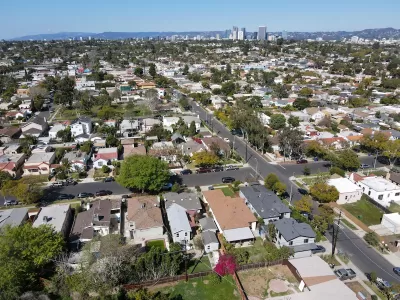Housing developers will no longer be required to dedicate land to roadway widening, which could significantly reduce the cost of construction and support more housing units.

Among the raft of bills signed by California Governor Newsom last week is Assembly Bill 3177, which prohibits local governments and agencies from requiring road widening next to new housing developments to achieve higher traffic flow, known as “level of service,” or “to achieve a desired roadway width.”
Under the new law, local governments would need to provide “substantial evidence” to require setting aside land for new roadway space, explains Melanie Curry in Streetsblog California. The law explicitly calls out a Los Angeles city law that calls for piecemeal “spot widening” in front of new developments, which often results in a zig-zag pattern that doesn’t improve traffic and eliminates thousands of square feet of land that could have been used for additional housing. While AB 3177 will eliminate this requirement for residential projects, the Los Angeles law will still apply to other types of developments.
According to the bill’s analysis, “A 2016 research study published in the Journal of Transport and Land Use found that road widening requirements in Los Angeles can cost developers over $10,000 per unit, resulting in up to hundreds of thousands of dollars being added to projects subjected to these requirements in certain instances.”
FULL STORY: Legislative Update: Ending Harmful Road Widening, and Redefining “Major Transit Stops”

Maui's Vacation Rental Debate Turns Ugly
Verbal attacks, misinformation campaigns and fistfights plague a high-stakes debate to convert thousands of vacation rentals into long-term housing.

Planetizen Federal Action Tracker
A weekly monitor of how Trump’s orders and actions are impacting planners and planning in America.

San Francisco Suspends Traffic Calming Amidst Record Deaths
Citing “a challenging fiscal landscape,” the city will cease the program on the heels of 42 traffic deaths, including 24 pedestrians.

Defunct Pittsburgh Power Plant to Become Residential Tower
A decommissioned steam heat plant will be redeveloped into almost 100 affordable housing units.

Trump Prompts Restructuring of Transportation Research Board in “Unprecedented Overreach”
The TRB has eliminated more than half of its committees including those focused on climate, equity, and cities.

Amtrak Rolls Out New Orleans to Alabama “Mardi Gras” Train
The new service will operate morning and evening departures between Mobile and New Orleans.
Urban Design for Planners 1: Software Tools
This six-course series explores essential urban design concepts using open source software and equips planners with the tools they need to participate fully in the urban design process.
Planning for Universal Design
Learn the tools for implementing Universal Design in planning regulations.
Heyer Gruel & Associates PA
JM Goldson LLC
Custer County Colorado
City of Camden Redevelopment Agency
City of Astoria
Transportation Research & Education Center (TREC) at Portland State University
Jefferson Parish Government
Camden Redevelopment Agency
City of Claremont





























